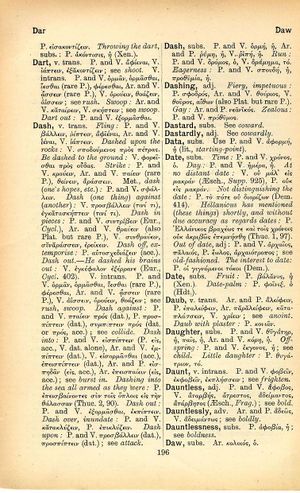dash: Difference between revisions
Έγ', ὦ ταλαίπωρ', αὐτὸς ὧν χρείᾳ πάρει. Τὰ πολλὰ γάρ τοι ῥήματ' ἢ τέρψαντά τι, ἢ δυσχεράναντ', ἢ κατοικτίσαντά πως, παρέσχε φωνὴν τοῖς ἀφωνήτοις τινά –> Wretched brother, tell him what you need. A multitude of words can be pleasurable, burdensome, or they can arouse pity somehow — they give a kind of voice to the voiceless.
(CSV3) |
m (Woodhouse1 replacement) |
||
| Line 1: | Line 1: | ||
{{Woodhouse1 | {{Woodhouse1 | ||
|Text=[[File:woodhouse_196.jpg|thumb|link={{filepath:woodhouse_196.jpg}}]] | |Text=[[File:woodhouse_196.jpg|thumb|link={{filepath:woodhouse_196.jpg}}]] | ||
===verb transitive=== | |||
[[fling]]: [[prose|P.]] and [[verse|V.]] [[βάλλειν]], [[ῥίπτειν]], [[ἀφιέναι]], [[Aristophanes|Ar.]] and [[verse|V.]] [[ἱέναι]], [[verse|V.]] [[ἰάπτειν]]. | |||
[[dashed upon the rocks]]: [[verse|V.]] [[σποδούμενος πρὸς πέτρας]]. | |||
[[be dashed to the ground]]: [[verse|V.]] [[φορεῖσθαι πρὸς οὖδας]]. | |||
[[strike]]: [[prose|P.]] and [[verse|V.]] [[κρούειν]], [[Aristophanes|Ar.]] and [[verse|V.]] [[παίειν]] (rare [[prose|P.]]), [[θείνειν]], [[ἀράσσειν]]. | |||
Met., | Met., [[dash]] ([[one's hopes]], etc.): [[prose|P.]] and [[verse|V.]] [[σφάλλω]], [[σφάλλειν]]. | ||
[[dash]] ([[one thing]]) [[against]] ([[another]]): [[verse|V.]] [[προσβάλλειν]] ([[τινί]] τι). [[ἐγκατασκήπτειν]] ([[τινί]] τι). | |||
[[dash in pieces]]: [[prose|P.]] and [[verse|V.]] [[συντρίβειν]] ([[Euripides|Eur.]], ''Cyclops''), [[Aristophanes|Ar.]] and [[verse|V.]] [[θραύειν]] (also [[Plato]] but rare [[prose|P.]]), [[verse|V.]] [[συνθραύειν]], [[συναράσσειν]], [[ἐρείκειν]]. | |||
[[dash off]], [[extemporise]]: [[prose|P.]] [[αὐτοσχεδιάζειν]] (acc.). | |||
[[dash out]]. — [[he dashed his brains out]]: [[verse|V.]] [[ἐγκέφαλον ἐξέρρανε]] ([[Euripides|Eur.]], ''[[Cyclops]]'' 402). | |||
===verb intransitive=== | |||
[[prose|P.]] and [[verse|V.]] [[ὁρμᾶν]], [[ὁρμᾶσθαι]], [[ἵεσθαι]] (rare [[prose|P.]]), [[φέρεσθαι]], [[Aristophanes|Ar.]] and [[verse|V.]] [[ᾄσσειν]] (rare [[prose|P.]]), [[verse|V.]] [[ἀΐσσειν]], [[ὀρούειν]], [[θοάζειν]]; see [[rush]], [[swoop]]. | |||
[[dash against]]: [[prose|P.]] and [[verse|V.]] [[πταίειν πρός]] (dat.), [[prose|P.]] [[προσπίπτειν]] (dat.), [[συμπίπτειν πρός]] (dat. or [[πρός]], acc.), see [[collide]]. | |||
[[dash into]]: [[prose|P.]] and [[verse|V.]] [[εἰσπίπτειν]] ([[prose|P.]] [[εἰς]], acc., [[verse|V.]] dat. [[alone]]), [[Aristophanes|Ar.]] and [[verse|V.]] [[ἐμπίπτειν]] (dat.), [[verse|V.]] [[εἰσορμᾶαθαι]] (acc.), [[ἐπεισπίπτειν]] (dat.), [[Aristophanes|Ar.]] and [[prose|P.]] [[εἰσπηδᾶν]] ([[εἰς]], acc.), [[Aristophanes|Ar.]] [[ἐπεισπαίειν]] ([[εἰς]], acc.); see [[burst in]]. | |||
[[dashing into the sea all armed as they were]]: [[prose|P.]] [[ἐπεισβαίνοντες σὺν τοῖς ὅπλοις εἰς τὴν θάλασσαν]] ([[Thucydides|Thuc.]] 2, 90). | |||
[[dash out]]: [[prose|P.]] and [[verse|V.]] [[ἐξορμᾶσθαι]], [[ἐκπίπτειν]]. | |||
[[dash over]], [[inundate]]: [[prose|P.]] and [[verse|V.]] [[κατακλύζω]], [[κατακλύζειν]], [[prose|P.]] [[ἐπικλύζειν]]. | |||
[[dash upon]]: [[prose|P.]] and [[verse|V.]] [[προσβάλλειν]] (dat.), [[προσπίπτειν]] (dat.); see [[attack]]. | |||
===substantive=== | |||
[[prose|P.]] and [[verse|V.]] [[ὁρμή]], ἡ, [[Aristophanes|Ar.]] and [[prose|P.]] [[ῥύμη]], ἡ, [[ῥιπή]], ἡ. | |||
[[run]]: [[prose|P.]] and [[verse|V.]] [[δρόμος]], ὁ, [[verse|V.]] [[δράμημα]], τό. | |||
[[eagerness]]: [[prose|P.]] and [[verse|V.]] [[σπουδή]], ἡ, [[προθυμία]], ἡ. | |||
}} | }} | ||
Revision as of 08:49, 20 May 2020
English > Greek (Woodhouse)
verb transitive
fling: P. and V. βάλλειν, ῥίπτειν, ἀφιέναι, Ar. and V. ἱέναι, V. ἰάπτειν.
dashed upon the rocks: V. σποδούμενος πρὸς πέτρας.
be dashed to the ground: V. φορεῖσθαι πρὸς οὖδας.
strike: P. and V. κρούειν, Ar. and V. παίειν (rare P.), θείνειν, ἀράσσειν.
Met., dash (one's hopes, etc.): P. and V. σφάλλω, σφάλλειν.
dash (one thing) against (another): V. προσβάλλειν (τινί τι). ἐγκατασκήπτειν (τινί τι).
dash in pieces: P. and V. συντρίβειν (Eur., Cyclops), Ar. and V. θραύειν (also Plato but rare P.), V. συνθραύειν, συναράσσειν, ἐρείκειν.
dash off, extemporise: P. αὐτοσχεδιάζειν (acc.).
dash out. — he dashed his brains out: V. ἐγκέφαλον ἐξέρρανε (Eur., Cyclops 402).
verb intransitive
P. and V. ὁρμᾶν, ὁρμᾶσθαι, ἵεσθαι (rare P.), φέρεσθαι, Ar. and V. ᾄσσειν (rare P.), V. ἀΐσσειν, ὀρούειν, θοάζειν; see rush, swoop.
dash against: P. and V. πταίειν πρός (dat.), P. προσπίπτειν (dat.), συμπίπτειν πρός (dat. or πρός, acc.), see collide.
dash into: P. and V. εἰσπίπτειν (P. εἰς, acc., V. dat. alone), Ar. and V. ἐμπίπτειν (dat.), V. εἰσορμᾶαθαι (acc.), ἐπεισπίπτειν (dat.), Ar. and P. εἰσπηδᾶν (εἰς, acc.), Ar. ἐπεισπαίειν (εἰς, acc.); see burst in.
dashing into the sea all armed as they were: P. ἐπεισβαίνοντες σὺν τοῖς ὅπλοις εἰς τὴν θάλασσαν (Thuc. 2, 90).
dash out: P. and V. ἐξορμᾶσθαι, ἐκπίπτειν.
dash over, inundate: P. and V. κατακλύζω, κατακλύζειν, P. ἐπικλύζειν.
dash upon: P. and V. προσβάλλειν (dat.), προσπίπτειν (dat.); see attack.
substantive
P. and V. ὁρμή, ἡ, Ar. and P. ῥύμη, ἡ, ῥιπή, ἡ.

